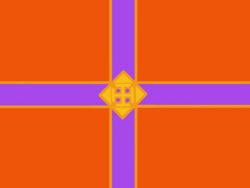Flags of North Bardonia: Difference between revisions
No edit summary |
|||
| (One intermediate revision by the same user not shown) | |||
| Line 1: | Line 1: | ||
{{WIP}} | |||
Throughout the many years the Flags of North Bardonia and its predecessors states have changed and evolved throughout the many centuries. Each of the numerous states that have adopted there own local flags. | Throughout the many years the Flags of North Bardonia and its predecessors states have changed and evolved throughout the many centuries. Each of the numerous states that have adopted there own local flags. | ||
| Line 12: | Line 14: | ||
=== Kingdom of North Bardonia === | === Kingdom of North Bardonia === | ||
[[File:NorthBardonia.png.png|thumb|250x250px|The flag used from 1896 to 1933 and again from 2018 to now. The flag remains a symbol of the Monarchist movement in North Bardonia.]] | [[File:NorthBardonia.png.png|thumb|250x250px|The flag used from 1896 to 1933 and again from 2018 to now. The flag remains a symbol of the Monarchist movement in North Bardonia.]] | ||
The flag of modern-day North Bardonia and the flag of the late Kingdom of North Bardonia are exactly identical. Designed in 1885 by Steffon Croust (A prominent North Bardonian artist) to represent the struggle of the lands people. | The flag of modern-day North Bardonia and the flag of the late Kingdom of North Bardonia are exactly identical. Designed in 1885 by Steffon Croust (A prominent North Bardonian artist) to represent the struggle of the lands people. Commission by the National Liberation Movement the orange was said to symbolize the land, arid and dry, the purple to represent its heritage, contain the colour of Carthiada and late was a symbol of the monarchy, and finally the gold representing the richness of the land, the culture, and the people. At the flags heart was the classical symbol of Carthiada: The Square turned on with the cross of the Faith and purple dots representing the trade alongside the four triangles that represented the four quarters of society. The flag itself has been a common symbol for North Bardonias monarchist movement and the ideals of liberalism compared to the ironic twist that the republic flag, which's intention was to inspire liberty and freedom for the people. The flags simplistic yet complex symbolism tells a tale of the land it represents; from afar it looks generic and plain with the purple and orange that contrasts each other but upon closer observation you can see the detail of the gold and the beuty of the symbol that lies at its heart: Carthiada. | ||
=== Republic of North Bardonia === | === Republic of North Bardonia === | ||
Latest revision as of 10:15, 22 October 2024
This article is incomplete because it is pending further input from participants, or it is a work-in-progress by one author. Please comment on this article's talk page to share your input, comments and questions. Note: To contribute to this article, you may need to seek help from the author(s) of this page. |
Throughout the many years the Flags of North Bardonia and its predecessors states have changed and evolved throughout the many centuries. Each of the numerous states that have adopted there own local flags.
Historic National Flags
Ancient Carthiada
Kharistan
Viceroyalty of North Bardonia
Governorate of Straits Settlement
Kingdom of North Bardonia
The flag of modern-day North Bardonia and the flag of the late Kingdom of North Bardonia are exactly identical. Designed in 1885 by Steffon Croust (A prominent North Bardonian artist) to represent the struggle of the lands people. Commission by the National Liberation Movement the orange was said to symbolize the land, arid and dry, the purple to represent its heritage, contain the colour of Carthiada and late was a symbol of the monarchy, and finally the gold representing the richness of the land, the culture, and the people. At the flags heart was the classical symbol of Carthiada: The Square turned on with the cross of the Faith and purple dots representing the trade alongside the four triangles that represented the four quarters of society. The flag itself has been a common symbol for North Bardonias monarchist movement and the ideals of liberalism compared to the ironic twist that the republic flag, which's intention was to inspire liberty and freedom for the people. The flags simplistic yet complex symbolism tells a tale of the land it represents; from afar it looks generic and plain with the purple and orange that contrasts each other but upon closer observation you can see the detail of the gold and the beuty of the symbol that lies at its heart: Carthiada.
